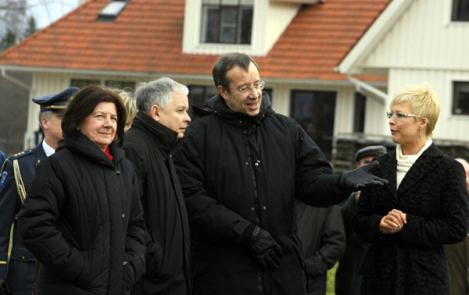-
Reset
+


The Estonian Head of State to the Polish President: our challenge lies in the question of how to create a more peaceful Europe and a more stable world
18.03.2008
At their meeting, President Toomas Hendrik Ilves and Polish Head of State Lech Kaczyński, who arrived in Estonia on a one-day working visit, spoke at length about the future of Europe, the enlargement of NATO, the EU Neighborhood Policy, and energy security.
“The excellent relations between Estonia and Poland are characterized by mutual trust and understanding,” President Ilves affirmed, at the meeting with the Polish Head of State at his Ärma homestead. “Our—Estonia and Poland’s—challenge lies in the question of how such trust and understanding can be created among as many countries and international organizations as possible, which would result in a more peaceful Europe and a more stable world.”
The Estonian Head of State stressed the importance of ratifying the Lisbon Agreement to ensure the better functioning of the European Union, saying that the non-ratification of the agreement would be a setback for the development of the Union.
Presidents Ilves and Kaczyński spoke about the NATO Summit in April and supported the continuation of the alliance’s open-door policy.
“Assuming that the candidate states of Croatia, Macedonia, and Albania continue the necessary reforms, we favor all three being invited to join NATO at the Bucharest Summit,” said the Estonian Head of State. “At the same time, our eagerness to support the further Euro-Atlantic integration of Georgia and Ukraine must not abate, whereas third countries should not have indirect veto power in respect to the alliance’s decisions.”
Speaking about European Union support for Ukraine, Georgia, and Moldova, the Estonian and Polish Presidents acknowledged that the expansion of the prosperity zone by countries that think and act similarly to the Community is beneficial for everyone.
“We must encourage the countries that have set out on the path of democracy and economic reforms to be resolute and self-confident in continuing their efforts, which, in addition to assistance and consultation programs, also means a forward-looking EU open-door policy,” President Ilves affirmed.
Speaking about security policies, President Ilves said that Estonia supports the development of collective NATO missile defense systems, which would be tied to the principles based on the Alliance’s Article 5—collective defense and equal defensibility.
“Estonia expects a clear decision at the NATO Summit in Bucharest, which will implement the development of the political principles related to missile defense, as well as for the consultation mechanisms and burden-sharing, said the Estonian Head of State. “Therefore it is important that solutions also be found for the defense of those NATO allies in Europe who are not covered by the U.S. national defense system. Thus our goal should be a uniform integrated system that protects the entire NATO territory.”
Speaking about the situation in Kosovo, the Heads of State expressed their hope for a pacification of the situation, and considered coordinated and decisive actions by NATO and the European Union to be important.
The Heads of State also spoke about operations in Afghanistan and Iraq, placing great importance on the passage of a new NATO strategy for Afghanistan, and on increased contributions by the European Union and the U.N. to help get this country on its feet.
Speaking about energy security, Heads of State Ilves and Kaczyński stressed that the European Union must speak with one voice.
“The first step in achieving this one voice is the mandatory notification of the European Commission and other member states of projects and agreements that affect the security and supply reliability for the entire Community,” President Ilves said. “A situation in which member states find out about agreements that have been signed through the media is not sensible.”
The Estonian Head of State stressed that, from the standpoint of the security of the Baltic countries, the construction of the Ignalina nuclear plant in Lithuania and connections between the Baltic countries and Poland that would guarantee consolidation with UCTE, the European power transmission system, are especially important, and added, “It is necessary to achieve clarity regarding the future progress of the Ignalina process and among the partners. We think the speedy signing of the shareholders’ agreement between the Estonian, Latvian, Lithuanian, and Polish power companies and the establishment of a project company is essential.”
The important decisions related to the Ignalina nuclear power station project, e.g. the choice of the reactors, must be decided by a consensus of the partners, President Ilves said.
He also said that the European Union’s energy relations with Russia must be on a contractual basis, adding, “The new framework agreement between the European Union and Russia must include the principles of the Energy Charter Treaty, which specify equality, transparency, and non-discrimination. A new legally binding framework agreement would create a clearer and broader legal basis for the Community’s relations with Russia.”
The Estonian and Polish Presidents adopted a joint declaration calling upon the governments of the European states to discuss the possibility of creating an international commission to investigate Communism's crimes against humanity and violations of human rights.
Office of the President
Public Relations Department
Phone +372 631 6229



